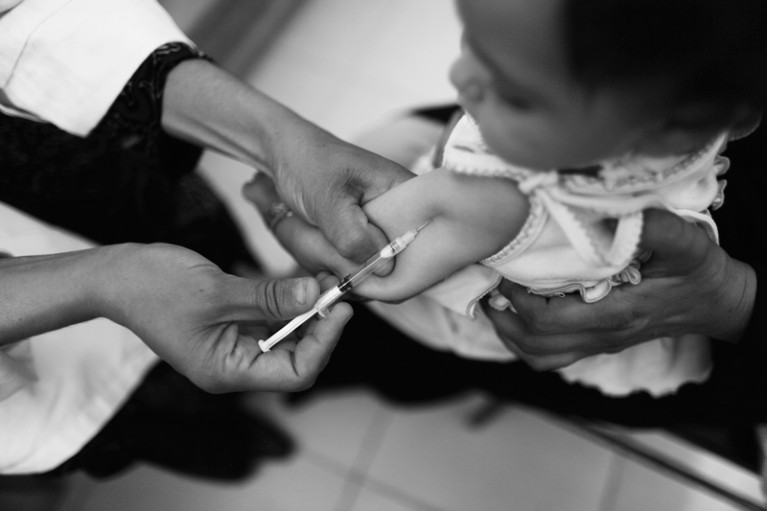
A new French law that makes childhood vaccinations mandatory has divided opinion.Credit: Tom Koene/Visuals Unlimited, Inc./SPL
It is one thing to be certain (as Nature is) that widespread immunization is a vital tool for public health. But it is much more contentious, given the diversity of humanity’s ethical and cultural norms, to impose vaccinations on a population. That diversity is reflected, for example, by differing choices among countries in Europe: some (mostly the post-Soviet Union states) make vaccinations for many diseases mandatory, whereas the majority do not.
France is now providing a case study of exactly these debates.
A new French law requires that babies born after 1 January be vaccinated in their early years against 11 diseases. Previously, vaccines against only three of these — diptheria, tetanus and polio — were mandatory. The others were recommended, but the decision was left to parents. Now, children must also be vaccinated against Haemophilus influenzae B, hepatitis B, pertussis, pneumococcal disease, meningitis C, measles, mumps and rubella. Those who haven’t had all their immunizations, including booster shots, the government says, will be refused admission to nurseries, schools and camps in France.
This policy is dividing public-health scientists in the country. Many French general practitioners are among those who argue that the measure is authoritarian and could backfire, not least by alienating parents and increasing wariness of vaccines in a country where various health scandals (most infamously, HIV-infected blood transfusions given in the early 1980s to people with haemophilia) have spread mistrust of health authorities.
Misguidedly, authorities seem to think that the new law is a pertinent response to scare stories about the safety of childhood vaccines, in particular, those told by anti-vaccine groups. Countering such misinformation is important, but does not alone constitute the basis for a coherent vaccine policy. Data on vaccine coverage of most diseases in France show that the situation is now better than it has been in years. Coverage rates for some newer vaccines are too low, but have nonetheless been increasing; the rates of meningitis-C vaccination, for example, have steadily increased since it was introduced a decade ago, from just 48% among 2 year olds at the end of 2011 to 71% in 2016. But vaccine coverage in France for most diseases is high overall. The challenge is rather to develop policies that will get the stragglers vaccinated to ensure that enough of the population is immunized to surpass the thresholds needed for herd immunity.
To portray societal hesitation about vaccination as a simple battle between anti-vaccine groups and ignorant populations on the one side, and scientific reason and public health on the other — as the French government has done — promotes an unproductive and sterile controversy, and a simplified view that obscures complex issues, such as the multiple causes of ‘vaccine hesitancy’ in populations, and the fundamental role of building trust in health-care institutions and information from government and scientists.
One of the biggest practical problems that France faces is the often poor follow-through of booster shots. Health data show that only eight in ten babies get the MMR booster (for mumps, measles and rubella) due at 18 months of age — a lower rate than in many other countries, and a problem because it weakens herd immunity in the population.
This has no-doubt contributed to a slight recrudescence of measles in the country, with a few dozen to a few hundred cases annually — and in particular, to an epidemic of several thousand cases in 2010 and 2011. But the French government’s reaction of making childhood vaccines mandatory is simplistic, and reneges on the administration’s greater responsibility to work patiently hand in hand with health-care workers and the public to improve what is already high take-up of vaccines. Multiple studies show that simple reminders — text messages among them — of when vaccines and booster shots are due can have a big impact on compliance and coverage. The same is true of national electronic vaccine-information systems to track people’s vaccinations, an area in which much progress remains to be made.
To its credit, the French government has pledged to review annually the compliance and impact of the new law. But in a country where ‘liberté’ is one of the three pillars of the national motto, the heavy-handed law could do something that nobody involved wants: fuel further unfounded resistance to life-saving vaccines. Making vaccines mandatory should be at most a stopgap. The only sustainable policy is for the government to put its efforts into making a strong case to the public about the benefits of vaccinations, and to better use the available evidence to implement more proactive strategies that can extend already respectable coverage rates for most diseases to those vaccines that are lagging.






